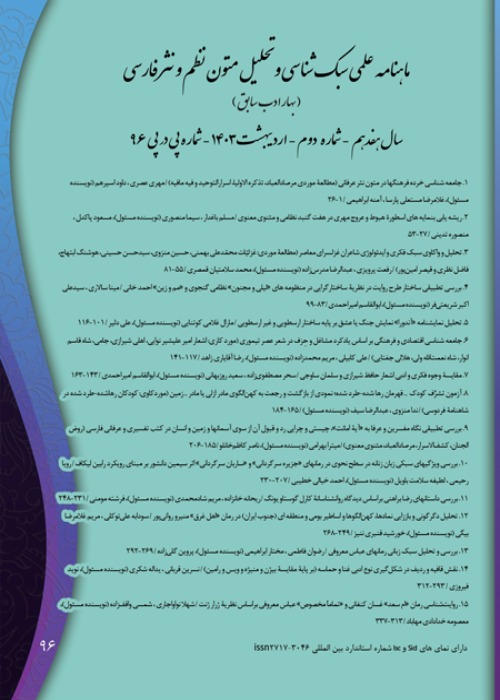architextuality reading of Hafez's poems based on Gerard Genet's theory of transtextuality
This article was written with the purpose of architextuality reading of Hafez's poems based on Gerard Genet's theory of transtextuality. Genet calls the long-term relationship between a work and the type it belongs to as architextuality. For this purpose, considering the importance of the typology of Hafez's poems, this issue has been investigated in the context of architextuality reading.
This research has been conducted as a theoretical study in the form of a laboratory study. The scope of the study is Hafez's Diwan Ghazliat edited by Ghasem Ghani and Mohammad Qazvini. In this research, an attempt was made to analyze Hafez's poems based on Gerard Genet's theory of transtextuality in a descriptive-analytical way.
According to Genet's concept of transtextuality, the results of the research indicate that the main text of Hafez's poems can also be classified into the following types in terms of type and form: "political, didactic, eulogizing, appropriate, boastful, satirical and Satire, philosophical-mystical, prayerful, calumny and reproach."
Based on this, the results of this research have shown that the main text of Hafez's poems includes critical political poems, political praise poems, political resistance, political satire and political epic. Praise poems can be classified into types such as laudatory praise, descriptive laudatory, elegiac laudatory, descriptive laudatory, boastful laudatory. After the type of "prayer" and "humor and satire", the main text of Hafez's romantic and mystical poems can be classified under the philosophical and mystical type. On the other hand, the reprimanding poems of Hafez have titles such as "giving oneself over to blame and not being afraid and not angry at the slander of those who appear, avoiding the worldly world and thinking about goodness and expediency and disregarding name and shame, avoiding asceticism and ascetic sellers, avoiding hypocrisy, a critical view of It is classified as formal institutions, avoiding the claim of discovery and virtues, covering up flaws, avoiding self-righteousness and selfishness, fighting with the ego, and seeking salvation in love.
- حق عضویت دریافتی صرف حمایت از نشریات عضو و نگهداری، تکمیل و توسعه مگیران میشود.
- پرداخت حق اشتراک و دانلود مقالات اجازه بازنشر آن در سایر رسانههای چاپی و دیجیتال را به کاربر نمیدهد.


